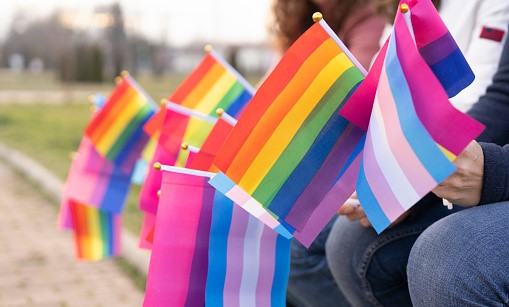
By Rachel Shaw
The Hood College history department has debuted a new course this semester, titled Queer Histories in the United States.
The course is discussion-based and is taught by Professor Mallory Huard, who joined the history department last semester.
“It’s a course that is designed to study not only the history of gender and sexuality in the United States but also to put LGBTQ people at the center of the conversation and to celebrate their histories,” Huard said.
The class is designed to discuss the often-overlooked history of the LGBTQA+ community.
“It’s a cliche, but representation does matter,” Huard said. “The first week of class we discuss the long history of sexuality and essentially how every category of human being has always existed in society, though it has not always looked the same in all places and time.”
While Huard has taught classes on US history as well as women’s gender and sexuality, this is her first time combining the two subjects and opening up a conversation between students rather than it just being another lecture-based class.
“It seemed like it would be a fun class, a class that would bring together history majors and expose them to topics that they probably wouldn’t be exposed to otherwise,” Huard said. “I think it’s important that history is not just about economics and warfare and presidents and all that.”
But the class isn’t just for history majors.
“It’s a class where you have history majors that have never learned anything about gay history, and then you have some queer students who are not history majors, but it’s a way to learn more about their history,” Huard said. “We have a good representation in the class which is fun because people are looking for perspectives.”
Some of the topics discussed include movements for equality, indigenous challenges with transgender binaries, the AIDS crisis, the gay scene in New York City, and the influence institutions have over our discussions of sexuality.
“Institutions have shaped conversations about gender and sexuality and created labels, have at times discriminated against, these institutions have the power to shape the categories of not only identity but also of experience,” Huard said. “Whether it’s the church, immigration policies, the legal infrastructure of the country, the military, or public spaces such as the YMCA. All of these institutions have the power to shape meanings about gender and sexuality.”
With many states are actively pushing for anti-LGBTQ bills and policies such as the “Don’t Say Gay” bill in Florida and the criminalization of gender-affirming treatments in states such as Texas and Arkansas, the class seems particularly relevant.
“I think the need for these types of courses feels increasingly urgent,” Huard said. “The students on Hood’s campus need more places to talk about these kinds of issues and histories.”

Be the first to comment